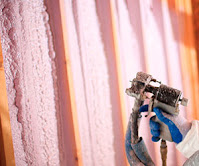
The thickness of spray foam insulation is determined by multiple factors. Insulation is rated by its R-value which measures the resistance to heat flow. A higher R-value indicates higher thermal resistance. The R-value is apparent for cellulose, fiberglass or mineral wool insulation. But the R-value of spray foam insulation depends on the type of spray foam that is installed.
The R-value of spray foam insulation is different. Spray foam insulation R-value is contingent on the type of spray foam insulation being applied. Spray foam insulation is available in open cell and closed cell.
The R-value of open cell spray foam is about 3.5 per inch, although the R-value can be different depending on the product. Open cell spray foam has a low density and is many times applied in interior walls and areas that are hard to reach in a home.
The R-value of closed cell spray foam ranges from 5.0 to 7.0 per inch, although the R-value can be different depending on the product. Closed cell spray foam is denser than open cell spray foam and is often used in areas like basement box sills where it helps prevent moisture from entering the home.
So, to answer the question “How thick should spray foam insulation be?” the answer depends on certain factors. The U.S. Department of Energy recommends insulation levels relative to the climate zone and part of the structure being insulated. It is also essential to examine the degree of moisture permeability that is needed. These factors determine whether open cell or closed cell spray foam insulation should be installed.
Consult with a professional insulation contractor to ensure that your home has the correct amount of insulation. At Southland Insulators we have the expertise and training to advise you on the right insulation for your home.
